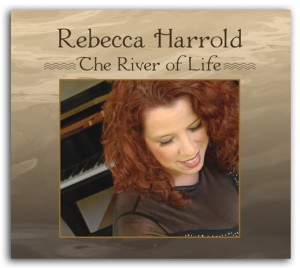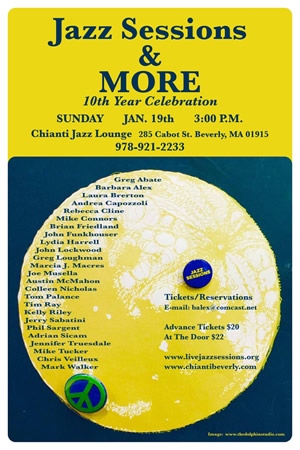After serving as piano player for the Boston Ballet for several years, Rebecca Harrold has recorded and released The River Of Life CD. Harrold fills each track with a variety of instrumental mood music. From stirring, striking themes to forlorn expressions of life’s not so happy moments. Through it all, Harrold maintains high musical integrity, sheer talent, and detailed expression. In each track, Harrold conveys the exact emotion she sets out to. Producer Will Ackerman captures every note with sonic precision and brings each to life with startling clarity.
Opening track “Photograph” finds Harrold tapping out a soft, gentle yet generous run of peppy, upbeat notes. The melodic line is both accessible and engaging. The music suggests a person is looking at an old picture and is contemplating what the picture means to her and may have meant in the past. Harrold works wonders at conjuring up that spirit of contemplation. Violinist Charlie Bisharat graciously supplies his own melodic line, a sweet high point in the song which indicates the picture has brought a smile to the viewer. Vocalist Penni Layne brings lovely cooing to lace this piece with more candy for the ear.
“We Belong Together” presses its way pleasantly into the listener’s consciousness, with Harrold’s more assertive application of the piano’s middle range notes. She has come up with a special interval of notes that dovetail finely with Jill Haley’s English horn. A touch of low end from Boston’s bassist to the stars Tony Levin keeps this composition lifted up by something special.
“G.O.D.” creates a generous majestic sweep with Harrold’s piano notes traipsing a wide sonic landscape. English horn notes glide in with their unobtrusive beauty and together with that piano suggest some larger than life presence is behind it all.
Title track “The River Of Life” says it all. The river, according to Harrold’s liner notes, represent the various paths one might take in life. Here, she injects a brief feeling of hesitation here or there, as to suggest a person stopping at each crossroad to make a choice. There is true emotion in each note Harrold hits and she creates the kind of sublime moments of truth that only a musician who has an ear for life and an ear for music at once can do. One can easily imagine this piece playing at a high point of drama in a soundtrack or production score.
It is easy to feel the stirring emotional backdrop to “Without You.” Supple piano notes suggest a void left by serious loss. Eugene Friesen’s cello colors in the piece perfectly. It’s as if the instruments all are waltzing together to a sad pulse.
“Another Time Another Place” creates a sense of what may have been if something had happened under other circumstances. This contemplation of what if haunts the mind with its light touches of piano, English horn, cello, and bass joining their subtle parts into a beauteous whole. And that cello is beautifully mournful and expressive.
“Morning Dove” is as lovely as it’s title suggests. Harrold slowly percolates some mid range notes, creating a feeling of flight, lofty, up high. Yet, underneath all that there is a persistent hint of melancholy. The dove must represent a kind of mourning, a soul departing. Harrold does a fine job rendering the beauty of going somewhere better while feeling the loss down here on the earthly plain.
Harrold injects swift assertive notes on “Gotta Never Give Up.” Her notes persistently weave a theme of perseverance. Percussionist and engineer Tom Eaton supplies a brisk rhythmic pattern underneath that spiral of sweetly ascending piano notes.
“Sentimental Roll” moves with an adventurous pace and spirit. Piano notes march in a spiral motion that connotes action and drama. English horn uplifts the listener with its sweet, lofty melodic line. Violin moves gracefully as a ballet dancer. Sentiment here is a wonderful thing.
“Say You Won’t” plays out like an amicable plea. The higher notes and the lower notes Harrold plays at once are like a conversation between two agreeable personalities. Her melodic line opens the space for soprano saxophonist Premik Tubbs to contribute a fulsome sweet flow just above it. There’s magic coming that horn, a personality in between the piano and Jeff Haynes particularly pushy rhythmic pattern. The piece makes you feel you’re being invited to join in with a lively group of companions.
“Majesty” is the classiest track on this album of classy tracks. Harrold builds a sensitive melodic line and gracefully moves alongside an elegant violin line. The rhythms Harrold creates underneath the melody and counterpoint entice the listener with their clever pokes into the higher lines. Although warmth is never jettisoned, a regal personality is created by all of this sophisticated juxtaposition and one feels as if they’ve entered the castle for a personal interview.
The notes in “Willow Tree” are as pliant as the tiny parts of one. Harrold creates the perfect mood to indicate sentimental tenderness. It’s as if she’s building her arc around something tender to give it room to breathe and grow. Richard Gates’ Mouradian bass provides the most subtle support, almost imperceptible beneath the lower piano notes but essential to the fulsome quality of this piece.
Harrold wraps up her splendid gift of music with “On My Own.” The steady, down tempo notes certainly indicate backbone and independence. There is also a quality of grace under pressure indicated by how these bold notes flow seamlessly from one to the other. This is a graceful close to an album of graceful music, with it thick piano notes indicating that Harrold feels strong and emboldened by this project and that she will return for more. We’ll all be waiting.


